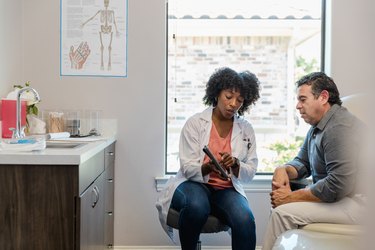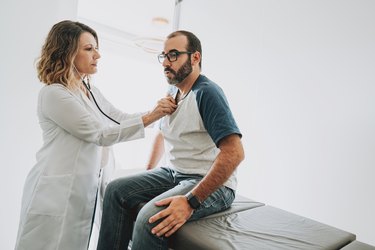
Before we dive into the things you shouldn't do at the cardiologist, let's start by saying it's great you're seeing a cardiologist in the first place. Taking care of your heart is important — especially as you age.
Heart disease is responsible for one out of every five deaths in the U.S., according to the Centers for Disease Control and Prevention, but catching it early (or its risk factors like high blood pressure and elevated cholesterol) gives you enough time to treat it properly.
Video of the Day
Video of the Day
While seeing your cardiologist is a great first step, there are some things you may unintentionally do to sabotage these appointments, like withholding information or lying to your doctor.
Here, learn habits that cardiologists wish their patients would stop doing at checkups.
1. Trying to “Look Good” for Your Doctor
No, this doesn't mean dressing in your best outfit, but rather, telling your cardiologist what you think they want to hear, says Elizabeth Klodas, MD, FACC, a preventive cardiologist in Edina, MN and creator of Step One Foods.
For example, you might say you never eat fast food (when you do), or that you eat fruits and vegetables every day (when you don't). The thing is, this information may change the course of your treatment, if a condition is uncovered at an appointment.
"A statin [cholesterol-lowering medication] is much more likely to be prescribed to someone with high cholesterol who also reports eating a healthy diet and not drinking too much," Dr. Klodas says.
On the other hand, if you have high cholesterol but admit to a not-so-great diet, your doctor may suggest trying diet and lifestyle changes first before medication, if that makes sense with your health history, Dr. Klodas says.
"Physicians are not mind readers. They can only rely on what you tell them," Dr. Klodas says. "They've also seen and heard it all, so you don't have to worry that you will shock or disappoint them," she adds.
2. Bringing Google Into the Mix
The internet can be a scary place, especially if you're worried about a certain health symptom and you recruit Google to get answers.
"Sometimes a patient has been Googling their symptoms and without proper context, pressures their doctor to order or prescribe certain things," says Mary Greene, MD, a cardiologist with Manhattan Cardiology in NYC and contributor to LabFinder.
The problem is that this can lead to "unnecessary and expensive" testing, she says.
While it's absolutely important to be an informed patient and advocate for yourself (especially if you feel your doctor's not listening to you), try to approach your appointment with a collaborative mindset, Dr. Greene says.
This means, it's OK to ask, "what do you think about this?" or "I read this online, does it apply to me?" and being open to what your doctor has to say. This will lead to a much more helpful discussion about what's best for you, Dr. Greene says.
3. Ignoring Your Symptoms
Maybe you've found it difficult to walk up the stairs lately. Or, you've started circling the parking lot to find a parking space closest to the grocery store entrance. Dr. Klodas wants you to pay attention to those symptoms — and report them to your cardiologist.
"No doubt our bodies become less cooperative as we age. But a lot of symptoms that people don't bother reporting (because they think they're a normal part of aging) can be clues to potentially reversible underlying health issues," she adds.
For instance, being short of breath during normal activities is a potential sign of cardiovascular disease — not just a sign that you're out of shape or getting older.
Another interesting example? Erectile dysfunction can also be a "first clue" you have atherosclerosis, Dr. Klodas says. Even when you think it isn't related, it might be, so don't be afraid to speak up.
4. Hiding Your Vices
Similar to wanting to "look good" for your cardiologist, there's a specific tendency to hide how much alcohol you drink, whether you smoke cigarettes and whether you use recreational drugs, says Allan Stewart, MD, a cardiac surgeon in Miami, FL.
These things are important to disclose at checkups, especially if you need heart surgery in the future. Why? Because it can affect your post-op recovery.
For example, if you drink every day and then go into surgery, you may have symptoms of alcohol withdrawal during recovery, and these symptoms can mimic a stroke, Dr. Stewart says. You may then be prescribed lots of expensive testing, which will also delay alcohol withdrawal treatment.
Dr. Stewart also says that smoking affects your recovery, while recreational drug use may affect the heart's response to medications and anesthesia.
"Surgeons are not judgmental people. We just want to know all of the possible issues we may face, so we can properly plan for your safe recovery," Dr. Stewart says.
The best time to talk about these things is during an in-office visit, when that planning can be done.
5. Forgetting to Schedule Follow-Up Visits
Not all of your concerns can or will be resolved in one office visit, Dr. Greene says. "Whenever you see any doctor, expect there to be some follow up," she says.
When it comes to specific heart issues, it may take time (and often multiple tests) to figure out what's going on. After these tests are complete, your cardiologist can come up with a personalized treatment plan.
Try to schedule any follow-up appointments at the end of your initial visit. And aim to see the same cardiologist each time, so they can continue the conversation about your specific needs.
"Building this doctor-patient relationship takes time, but can be helpful in getting the best treatment possible," Dr. Greene says.
Is this an emergency? If you are experiencing serious medical symptoms, please see the National Library of Medicine’s list of signs you need emergency medical attention or call 911.



